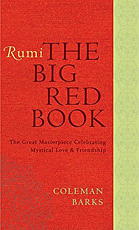As Coleman Barks points out in the introduction to this massive collection of poems, Rumi's spiritual life was turned around completely by his mystical friendship with Shams Tabriz. They had a profound and soulful relationship for about three and a half years in Konya in what is now Turkey. Then, without warning or reason, Shams disappeared. Coleman Barks notes the change: "Rumi's poetry went deeper. The core of longing became more radiant and vital, reflecting the depth of the communion that was the majestic friendship between Rumi and Shams." The poet named this collection of poems inspired by his soul mate and mentor his "big red book" and it originally contained 3,000 poems, about six times as many as there are here.
Barks confesses that he is blessed to have spent much of the second half of his life working on the poetry of Rumi. He believes that this Sufi mystic's message is found in all religions and draws out the best in all those who are yearning to live in freedom, joy, beauty, and meaning. Barks beckons us to enter into a conversation with these poems about soul:
"These are works in progress in a life in progress, oceanic living tissue, always reconfiguring itself. A music, in a dance around an enlightened being, or several enlightened friends, men and women. What a liveliness. You feel it coming through, even eight centuries later. The no-form joy of surrendered souls, playing. The poetry of The Shams is a connection to universal energy, the center itself. I feel that is true."
Part One consists of Rumi's Odes (Ghazals) which Barks has organized into 27 categories — 8 of which are from the Sufi Ninety-Nine Beautiful Names of Allah, in Arabic. Two of the categories are teachers who have influenced Barks: Bawa Muhaiyadden and Osho. Shams Tabriz is also one of the names for Mystery along with the great Indian saint Ramana Maharishi. The rest of the categories spring from Barks' own creative musings. One of our favorite poems in this is "The Most Alive Moment."
"The most alive moment comes when those who love each other
meet each other's eyes and in what flows between them then.
To see your face in a crowd of others,
or alone on a frightening street, I weep for that.
Our tears improve the earth. The time you scolded me,
your gratitude, your laughing,
always your qualities increase the soul.
Seeing you is a wine that does not muddle or numb.
We sit inside the cypress shadow where amazement
and clear thought twine their slow growth into us."
The second section of the book presents Rumi's Quatrains (Rubai) which Barks calls "invitations into a mystery, an awareness that lives beyond the mind." These short poems have "meditative properties and possibilities." Barks has divided the quatrains into 27 categories each associated with a constellation or other celestial body. A few of these poems are from previous collections of Rumi. Here are two of our favorites:
People want you to be happy.
Do not keep serving them your pain.
If you could untie your wings
and free your soul of jealousy,
you and everyone around you
would fly up like doves.
Lovers gather and give each other shade,
relief from the direct sun.
Stay closeby that community.
Be shade with them,
until you yourself are full of light
like the moon, then like the sun.
